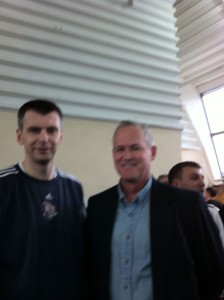
Putin supporters in Moscow may be from out of town, but they formed a majority in Sunday's election.
Russia’s democratic opposition now has to deal with the elephant in the living room: Russia’s silent majority elected Vladimir Putin President on Sunday.
This week in Moscow, there is a post mortem round of press conferences.
The European observer group correctly called the election process heavily skewed toward the official candidate.
Golos, the vote monitoring group, estimated that Putin won with “50 percent plus a pixel.” (Whatever that means).
On Wednesday, the Voters League, which includes many opposition figures, said their data gave Putin 53 percent of the vote.
For most Russians, Sunday’s election has enough legitimacy to last until oil prices collapse again. When that happens (it always does), Putin may find he is standing on a hill of sand.
But, for now, the opposition has to deal the election results.
In my first presidential election in the United States, I was a volunteer campaign worker for the Democratic presidential candidate, Sen. George McGovern. All the cool people were for McGovern. The argument against reelecting President Richard Nixon was crystal clear, a no brainer.
The American people did not buy that. Nixon’s silent majority carried every state, except mine, Massachusetts.
Today, I see a faint echo in Russia.
On Sunday, the urban elite turned against Putin. He failed to get a majority in Moscow and barely won a majority in his home city, St. Petersburg.
In a measure of Putin’s unpopularity in Russia’s two largest cities, his campaign billboards there did not feature his image. In Moscow, his one campaign event and his Sunday night victory rallies were not promoted locally. Instead, they were filled with supporters bused in from out of town.
Moscow is Russia’s media capital, and the press (myself included) have had a field day interviewing the smart, charming, self-confident, opposition supporters. Reporters love news, and this winter, the protest movement was new.
It was harder to break through to Putin supporters. They were often sullen, generally reluctant to talk to reporters, and often half-hearted in their support for Putin after 12 years of his rule. Mike Schwirtz did a fine job in his Sunday New York Times piece from Lubertsy.
This press failing reminds me of an insight a reporter friend, Ken Freed, gained while covering the Iranian revolution for The Los Angeles Times in the fall of 1978. When shooting broke out in Teheran between pro- and anti-Shah forces, he took refuge in an open street sewer in Teheran (where he caught a skin disease). Reflecting on the journalism business from this inglorious spot, Ken concluded that many foreign reporters had taken the easy path in Iran, interviewing those nice Iranians who spoke English and had studied oil production at the University of Texas. Those Iranians now live in Los Angeles.
Back to modern Russia.
Cool Russia and un-cool Russia will have to come to terms.
Opposition hardliners looking for direct confrontation play straight into the playbook of President-elect Putin. Ever since a 2004 tent encampment in Kyiv forced the annulment of a presidential election in Ukraine, Putin has been warning of the threat of “Orange Revolution.”
In January, as preparation for this post-election week, Putin doubled police salaries. On Monday night, his black uniformed Robo Cop police army was fully deployed in downtown Moscow – pumped up riot police with shields, bullet proof vests, black helmets and combat boots.
In a street confrontation, the opposition will lose. More importantly, it will lose the vast majority of middle class backers who have no interest in violence. One turnout test will be Saturday. The opposition has a permit, a forecast of sunny weather, and a central location – the New Arbat entertainment avenue.
But now, the opposition should focus on reforms that will swell their ranks long term.
Hold the Kremlin to its December promise to create a national “public” TV that would not answer to state controls. This would allow opposition voices to reach the half of Russia that is not online.
Another December promise — direct elections for governors, should be expanded to mayors. Democracy starts at grassroots level.

These Russians back Prime Minister Putin. Both pro-Putin and anti-Putin forces have adopted the ghostly Putin photo from the Time magazine's 2007 Person of the Year.
Mikhail Prokhorov, the billionaire businessman, came in second in Moscow and St. Petersburg. The nearly 1 million Muscovites who voted for him should pressure President-elect Putin to adopt Prokhorov’s agenda – cut red tape, cut corruption, and lift the dead weight of the state off the backs of entrepreneurs.
It is no accident that Russia’s pro-Putin silent majority was largely made up of voters dependent on the government – for jobs, pensions, and spending. Twenty years after the collapse of communism, about half of Russia’s economy still depends on the state.
Finally, with the arrival next month of spring, the street protest movement should migrate to city parks – like Moscow’s newly renovated Park Kulturii. There, in the tradition of the American teach-in and the French political kermesse, the tens of thousands of people who volunteered as election observers Sunday can channel their energies into putting in place the building blocks of civil society – joining neighborhood groups, green groups, women groups, new political parties, and, dare I say it, gay groups.
People want to work for causes where they see an impact. It was this growth of civil society that made possible Brazil’s transition in the 1980s and 1990s from military rule to multi-party democracy.
Russia’s evolution may be different. But as a friend remarked to me the other day: Russians are idealists disguised as cynics.







































